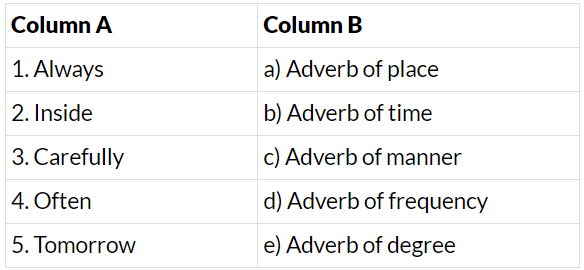Adverb Class 6 Worksheet English Grammar
Instruction
- Attempt all questions
- Use the given word limit for each section
- Answer the questions with the correct marking scheme as per the latest pattern of the exam.
- Keep a mixed difficulty level of questions from easy to hard
Section - A
Q.1. Multiple Choice Questions (MCQs) (1 mark each)
(i) Which of the following is an adverb of time?
(a) Slowly
(b) Yesterday
(c) Upstairs
(d) Everywhere
Correct Answer is Option (b)
(ii) Which of the following is an adverb of manner?
(a) Never
(b) Often
(c) Quickly
(d) Here
Correct Answer is Option (c)
(iii) Identify the adverb in the following sentence: "She will always remember this moment."
(a) She
(b) Will
(c) Always
(d) Remember
Correct Answer is Option (c)
(iv) Which of the following is an adverb of place?
(a) Soon
(b) Outside
(c) Loudly
(d) Sometime
Correct Answer is Option (b)
(v) Identify the adverb in the following sentence: "The teacher spoke too quickly for the students to understand."
(a) Teacher
(b) Spoke
(c) Too
(d) Understand
Correct Answer is Option (c)
Section - B
Q.2. Short Questions (2 marks each)
(i) Explain the difference between an adverb of manner and an adverb of time.
An adverb of manner describes how an action is performed, while an adverb of time tells when the action takes place.
(ii) Rewrite the following sentence using an adverb of frequency: "He usually goes to the gym."
"Usually, he goes to the gym."
(iii) Identify the adverb in the following sentence and mention its type: "The flowers bloom everywhere in the spring."
The adverb is "everywhere" and its type is an adverb of place.
(iv) Explain the function of adverbs in a sentence.
Adverbs modify or describe verbs, adjectives, or other adverbs, providing additional information about the action or the quality being described.
(v) Give an example of an adverb of degree and explain its meaning.
An example of an adverb of degree is "almost." It means "nearly" or "not quite."
Section - C
Q.3. Fill in the Blanks (1 mark each)
(i) She sang the song ________. (Adverb of manner)
Beautifully
(ii) The train will arrive ________. (Adverb of time)
Soon
(iii) The cat is hiding ________. (Adverb of place)
Under the bed
(iv) They ________ attend the meeting. (Adverb of frequency)
Rarely
(v) The soup is ________ hot. (Adverb of degree)
Too
Section - D
Q.4. Match the adverbs in Column A with their type in Column B (1 mark each)

1. d) Adverb of frequency
2. a) Adverb of place
3. c) Adverb of manner
4. d) Adverb of frequency
5. b) Adverb of time
Section - E
Q.5. True or False (1 mark each)
(i) Adverbs can only modify verbs.
False
(ii) Adverbs of manner answer the question "how."
True
(iii) Adverbs of place answer the question "when."
False
(iv) Adverbs of time answer the question "where."
False
(v) Adverbs of degree answer the question "to what extent."
True
Section - F
Q.6. Fill in the blanks with a suitable adverb.
(i) I have _______ been to the USA. (Never / ever)
I have never been to the USA. (frequency adverb)
(ii) I _______ take a bath before I go to bed. (once / always / ever)
I always take a bath before I go to bed. (frequency)
(iii) My friends are ______ non-smokers. (Most / mostly)
My friends are mostly non-smokers. (focusing adverb)
(iv) I ______ go for a walk in the park. (Once / always / sometimes)
I sometimes go for a walk in the park. (frequency adverb)
(v) They ______ go out. (Rare I once / rarely)
They rarely go out, (frequency adverb)
(vi) I _______ go to bed at 10 o’clock. (Once / ever / usually)
I usually go to bed at 10 o’clock. (adverb of frequency)
(vii) I have been to Australia just ______ (one / once / ones)
I have been to Australia just once. (frequency)
(viii) My grandparents live in Kerala. I visited them ______ (once / often)
My grandparents live in Kerala. I visited them often. (frequency)
(ix) I was _____ impressed with her performance. (Too / such / very)
I was very impressed with her performance. (degree adverb)
(x) I watch English films (Once / always / occasionally)
I watch English films occasionally. (frequency adverb)
|
49 videos|349 docs|46 tests
|
FAQs on Adverb Class 6 Worksheet English Grammar
| 1. What are adverbs and how do they function in a sentence? |  |
| 2. Can you give examples of different types of adverbs? |  |
| 3. How do adverbs differ from adjectives? |  |
| 4. Are adverbs always necessary in a sentence? |  |
| 5. How can I identify adverbs in a sentence? |  |
















